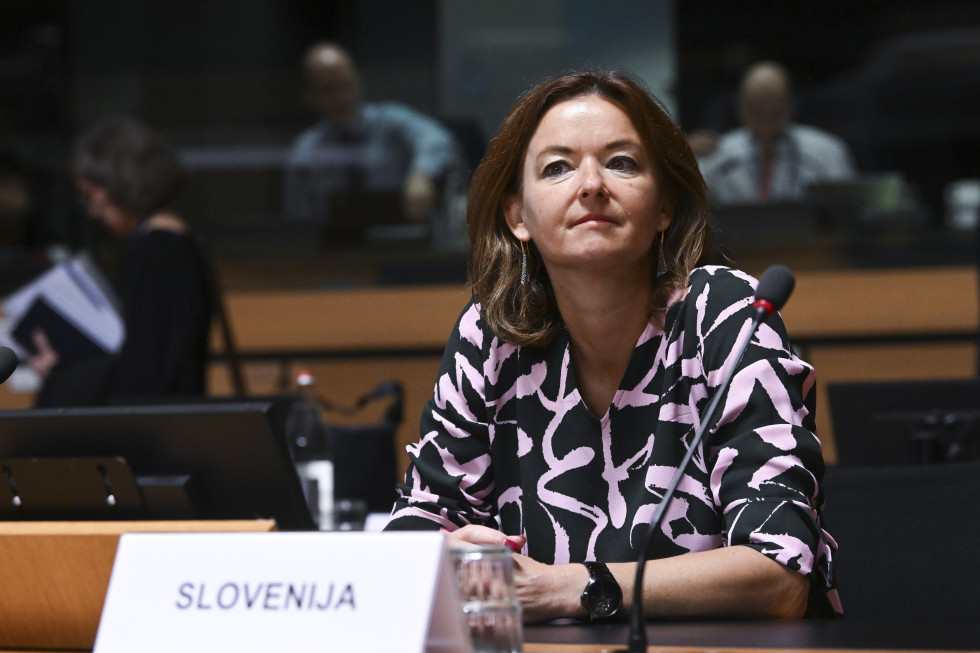Minister Fajon: "For peace in the Middle East, we must work with Arab partners and the US"
On the situation in the Middle East, the ministers discussed the current situation in Gaza and the international community's efforts to bring about a lasting and just ceasefire. In her intervention, Minister Fajon reiterated that Slovenia strongly condemns the killing of civilians and called for respect for the UN Security Council Resolution on an immediate ceasefire and the release of hostages. She also recalled the importance of respect for international law: "International law is not just a 'menu' from which you can cherry pick what suits you. It must be fully respected and upheld. To achieve peace in the Middle East, we must work with Arab partners and the US. We must work towards a two-state solution that allows for the peaceful coexistence and security of both peoples, the Israelis and Palestinians". Later she added: "I welcome the announcement by the European Commission and a number of countries to provide additional financial support to the United Nations Relief and Works Agency for Palestine Refugees (UNRWA). The Agency is the backbone of all humanitarian response in Gaza. I am pleased that the initiative by Slovenia, Jordan and Kuwait to make concrete commitments to support the work of the Agency, which is of vital importance to the civilian population, now has more than 50 signatories. The plan is to present it on the margins of the UNRWA donors' event in New York on 12 July 2024."
Ahead of their debate on the Russian aggression against Ukraine, the FAC was addressed by Ukraine’s Foreign Minister Dmytro Kuleba in a VTC intervention. He briefed them on the latest developments on the ground and Ukraine’s most pressing needs. Minister Fajon stressed that Slovenia will continue to support Ukraine and recalled that the Government of the Republic of Slovenia recently adopted a decision to allocate an additional €5 million for humanitarian aid and reconstruction in Ukraine in 2024. "Slovenia is committed to the peace process on the basis of the UN Charter and welcomes the convening of the Intergovernmental Conferences with Ukraine and Moldova tomorrow, 25 June 2024, which marks the formal start of accession negotiations for their membership of the EU. This is a significant and big step for both countries on their path towards the Union," said Minister Fajon. She added that the peace process launched in Lucerne was a step in the right direction, but that sooner or later Russian President Vladimir Putin would also have to come to the table.
EU Foreign Ministers were then joined by Foreign Affairs Ministers from the Western Balkan partner countries for a working lunch. Minister Fajon stressed that Slovenia would strongly support all mechanisms and initiatives to bring the Western Balkans closer to the EU. "I reminded my colleagues of the Bled Pledge, which sends an important message to countries on their way to the EU. We expect our partners in the region to uphold the EU's core values, including the Common Foreign and Security Policy, and to demonstrate a clear commitment to reform and to addressing challenges constructively. And the EU, for its part, must take decisive steps towards the enlargement as required by the changing political context. Now is the time to move ahead”. She added: "I would like to see a regular political dialogue with the Western Balkan countries. This is crucial for our security. I look forward to seeing all Western Balkan partners align their foreign and security policies with Europe. In a complex geopolitical situation, strategic orientation is crucial. Slovenia is also committed to creating a safer digital environment for the people in the Western Balkans through the centre it has set up with France in Montenegro".
EU Foreign Ministers also discussed the political developments in Georgia following the adoption of the Law on Transparency of Foreign Influence and the EU's approach in this regard. The adoption of laws that threaten freedom of expression, the functioning of civil society and independent media is not in line with the legally binding provisions of the EU-Georgia Association Agreement. Slovenia supports the clearly expressed will of the Georgian people to continue democratic reforms and will provide further assistance to Georgia within the EU.
The FAC also welcomed the agreement on the 14th package of sanctions against Russia in response to its war of aggression against Ukraine.


